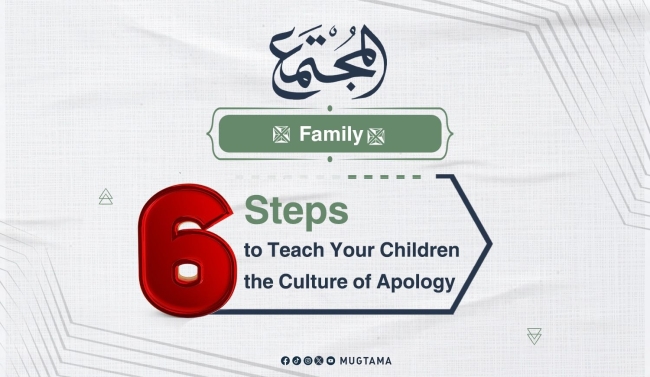6 Steps to Teach Your Children the Culture of Apology Featured
Apologizing is a characteristic of the prophets, a natural instinct of the righteous, and a noble behavior that brings goodness to society. Allah has made it one of the attributes of the pious, and wise people consider it a trait of greatness. Scholars and doctors regard it as a sign of a healthy psyche, while people see in it kindness and humility. So why shouldn’t we apologize and teach our children the culture of apology?
The Holy Quran records the reaction of Moses (peace be upon him) after he struck a man and killed him. He did not justify his action; rather, he acknowledged his wrongdoing, saying: “‘This is from the work of Satan. Indeed, he is a manifest enemy.’ He said, ‘My Lord, indeed I have wronged myself, so forgive me.’ And He forgave him. Indeed, He is the Forgiving, the Merciful.” (Al-Qasas: 15-16).
The wise mention how Balqis acknowledged her sin when she said: “My Lord, indeed I have wronged myself, and I submit with Solomon to Allah, Lord of the worlds.” (An-Naml: 44).
In the Prophetic tradition, there is a reinforcement of the culture of apology in the hadith: "All the sons of Adam are sinners, but the best of sinners are those who are given to repentance" (Sahih Hadith).
Studies in mental health show that a person exhibits 315 forms of defense mechanisms, the most common being justification, which is a psychological trick to absolve oneself of wrongdoing. The person who errs may believe that apologizing diminishes their worth, while in fact, it elevates their value and status.
A person may stubbornly refuse to apologize time and again until their ego becomes inflated, leading to more mistakes and making them despised in society, viewed as arrogant and conceited, ultimately losing the closest people to them.
If that person does apologize, experts classify it as either a superficial apology or one meant merely to lift the blame from themselves, which is insincere. There are also apologies made under coercion to avoid losing something or due to pressure, which are similarly insincere and unclear.
The best type of apology is one that is made promptly after the mistake occurs, is straightforward with no ambiguity, and is public when the mistake was witnessed by others.
In the family environment, it is essential to instill this culture in children so they realize they are human and that apologizing means correcting a mistake. This enhances their self-confidence and encourages self-reflection and correction from time to time.
In advanced societies, apologizing has become a behavior of politicians and celebrities. In fact, offering an apology can sometimes mitigate punishment for certain offenses, and it can resolve many social disputes and familial problems between spouses.
To instill this noble trait in children, educators recommend the following:
1. Do not justify mistakes: Avoid weak excuses and shifting blame onto others to evade responsibility for the error.
2. Apologize promptly: A swift apology resolves disputes quickly, while delaying it exacerbates the problem and deepens resentment in the one wronged.
3. Be clear with words: Deliver the apology in a clear and straightforward manner.
4. Choose the right time and place: Ensure that the apology is made in an appropriate setting.
5. Apologize publicly: If the mistake was witnessed by others, an apology in front of them is necessary.
6. Consider accompanying the apology with a gift or a gesture of kindness, such as a kiss on the forehead.
The best way to instill the culture of apology in children is for adults to model it themselves. It is wise for a parent to apologize in front of their children if they make a mistake, and if either parent errs toward their children, they must promptly apologize. This is the best way to reinforce this noble trait, which is synonymous with humility.
As educators, whether as fathers or mothers, we must teach our children the culture of apologizing for mistakes, as well as instilling in them the value of accepting apologies with forgiveness and tolerance. This practice preserves bonds of affection and brotherhood and strengthens the cohesion of families and communities.
-------------------------------------------------------------


